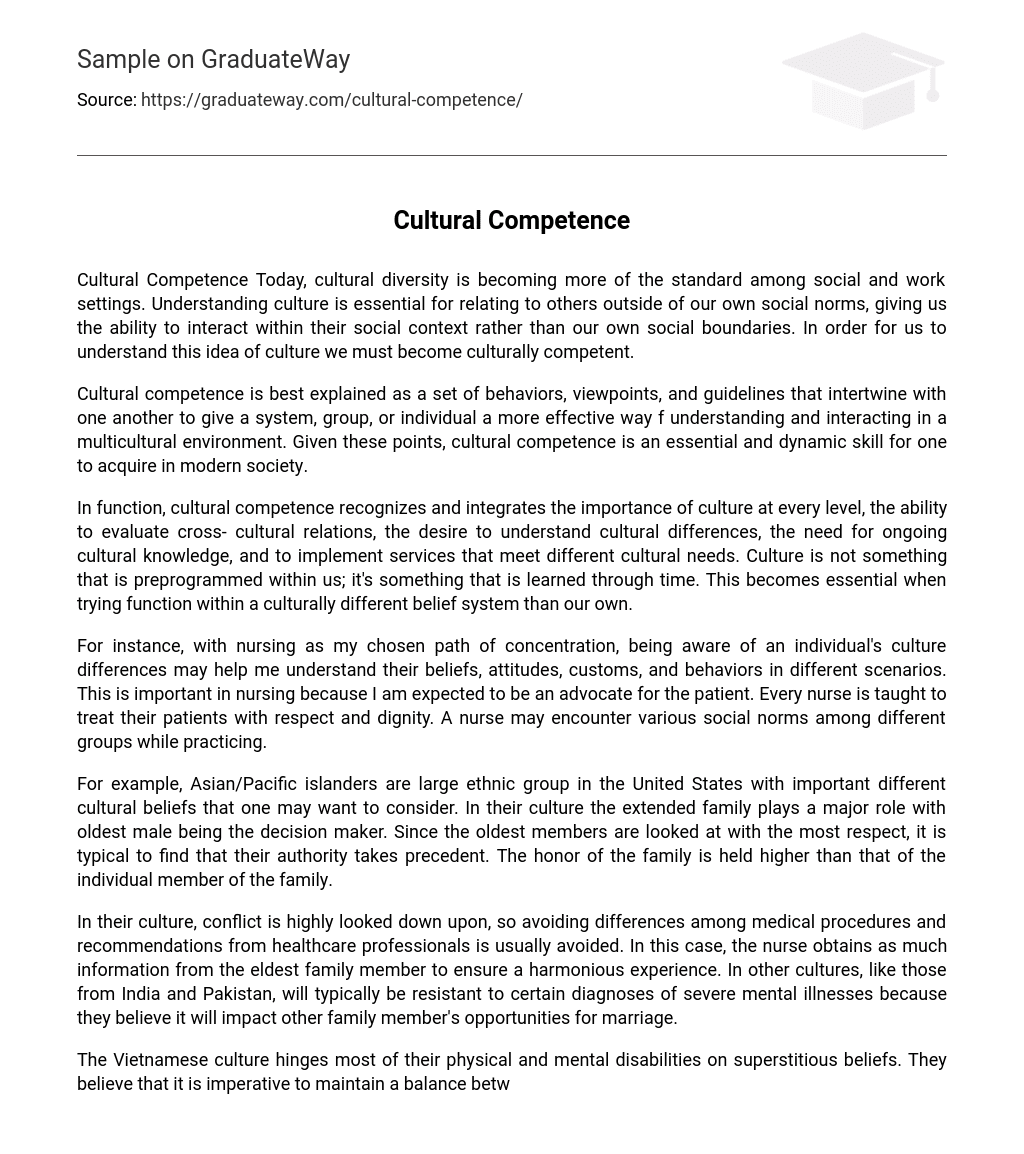Cultural Competence Today, cultural diversity is becoming more of the standard among social and work settings. Understanding culture is essential for relating to others outside of our own social norms, giving us the ability to interact within their social context rather than our own social boundaries. In order for us to understand this idea of culture we must become culturally competent.
Cultural competence is best explained as a set of behaviors, viewpoints, and guidelines that intertwine with one another to give a system, group, or individual a more effective way f understanding and interacting in a multicultural environment. Given these points, cultural competence is an essential and dynamic skill for one to acquire in modern society.
In function, cultural competence recognizes and integrates the importance of culture at every level, the ability to evaluate cross- cultural relations, the desire to understand cultural differences, the need for ongoing cultural knowledge, and to implement services that meet different cultural needs. Culture is not something that is preprogrammed within us; it’s something that is learned through time. This becomes essential when trying function within a culturally different belief system than our own.
For instance, with nursing as my chosen path of concentration, being aware of an individual’s culture differences may help me understand their beliefs, attitudes, customs, and behaviors in different scenarios. This is important in nursing because I am expected to be an advocate for the patient. Every nurse is taught to treat their patients with respect and dignity. A nurse may encounter various social norms among different groups while practicing.
For example, Asian/Pacific islanders are large ethnic group in the United States with important different cultural beliefs that one may want to consider. In their culture the extended family plays a major role with oldest male being the decision maker. Since the oldest members are looked at with the most respect, it is typical to find that their authority takes precedent. The honor of the family is held higher than that of the individual member of the family.
In their culture, conflict is highly looked down upon, so avoiding differences among medical procedures and recommendations from healthcare professionals is usually avoided. In this case, the nurse obtains as much information from the eldest family member to ensure a harmonious experience. In other cultures, like those from India and Pakistan, will typically be resistant to certain diagnoses of severe mental illnesses because they believe it will impact other family member’s opportunities for marriage.
The Vietnamese culture hinges most of their physical and mental disabilities on superstitious beliefs. They believe that it is imperative to maintain a balance between the hot and cold poles which rule their overall wellbeing. Since these cultures do not easily accept western medicine, it is important to build a trustworthy relationship in order for them to receive assistance. As we see, each cultural group has its own perspectives, beliefs, and values in regard to healthcare practices that do not mirror the conventional American healthcare standard.
Many healthcare professionals tend to believe that other cultures should conform to the traditional standard but this can build walls and these differences can change the attitude of individuals. This may make an individual less likely to seek out proper treatment. This is where Anthropology can help bridge the gap. It allows n individual to see how diverse humanity is in a wide range of ways and lets them embrace the many ways of being human within an array of culturally different groups.
It can also help healthcare professionals stay culturally relative to enhance individualized care by shedding any preconceived notions of a particular group. Anthropology allows a healthcare professional, patient, and their families the ability to bring culture specific ideas and morals to different healthcare concepts and ailments so that unique cultural needs can be met. Given these points, cultural competence is a must have tool for any individual searing to understand or relate to individuals outside of their own group.
I had the chance of using cultural competence first hand. Being a bartender in the hospitality industry for many years I’ve seen a pattern among foreign patrons that frequent the bar, I realized that a large majority of them did not leave gratuity on their bill and if they did it was very minimal at best. At first glance, couldn’t quite figure out why someone would purposely leave me such a low gratuity. Had I done something wrong? I began to inquire about this issue with friends that were from various foreign countries.
I was informed that individuals that were in the same profession received a higher hourly wage so they typically did not receive gratuity. In this circumstance, rather than just grouping all these individuals into a stereotype and giving them poor service in turn for low gratuity, I chose to educate myself as to why this was a common behavior among a group different than my own. Becoming more exploration of another groups culture and having the desire to learn their social norms will help yield a greater understanding of why they behave the way they do and allow the ability to relate with individuals on a larger scale.





